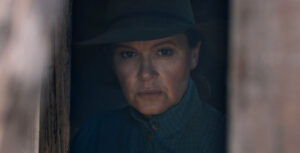SXSW Review: The Past Is Inevitable in “The Drover’s Wife: The Legend of Molly Johnson”
Written by: Christopher Llewellyn Reed | March 19th, 2021

The Drover’s Wife: The Legend of Molly Johnson (Leah Purcell, 2021) 3 out of 4 stars.
Based on Leah Purcell’s own eponymous play, itself based on Henry Lawson’s 1892 short story, The Drover’s Wife: The Legend of Molly Johnson travels similar tragic terrain as Jennifer Kent’s 2018 The Nightingale, closely examining Australia’s fraught, genocidal past. Purcell, herself, plays the titular character, an Outback frontierswoman struggling to make ends meet while her husband is away herding sheep. Though she may be unaware, as it turns out, of the truth of her origins, she is in possession of another secret that only she knows and holds close, and which we will later discover. Our dramatic satisfaction comes from watching the story’s hidden depths emerge, slowly revealing the horrors of European atrocities towards the indigenous population.
Purcell is herself a member of several of Australia’s First Nations, and so brings a needed perspective to any discussion of their treatment. When we first meet her in The Drover’s Wife, however, she is more than anything else a harried mother, her children hungry and in need of food. Good thing she is an expert shot, then, handily putting down a charging bull on her property, which in the next cut becomes a hardy meal. Even in the middle of what at first appears a straightforward narrative, Purcell jumps backwards or forwards (we’re not sure which way, yet) to far bloodier events, her face bruised and clothes smeared with red. Something was, or will be, quite amiss.

Into this uncertainty come two new arrivals, straight from England, husband-and-wife settlers here for a new start in the nearby town, he as constable and she not only as his spouse, but as suffragette extraordinaire, printing press in hand to enlighten the masses. They are Sergeant Klintoff (Sam Reid, The Limehouse Golem) and Louisa (Jessica De Gouw, OtherLife), and though from their perspectives they plan to make a difference, it’s not really their land, is it? Still, Klintoff’s trajectory continues to intersect with Molly’s, especially once the prime suspect in a gruesome local murder shows up near her house.
This would be Yadaka (Rob Collins, Undertow), whose appearance is anything but gentle, at least at first, especially to those brought up to fear and enslave the native people of the continent. Clearly a most capable individual, he has been brought low by circumstances beyond his control, given the extremely limited options available to him. And now he is a fugitive. Will Molly help? She’s about to give birth again, so she may have little choice. Then again, she’s also tough as nails. And much more than that, as it turns out. Purcell deftly plays with, and subverts, our expectations, transforming the story at its halfway point into something far more meaningful and profound than we anticipated. The Drover’s Wife, by its end, becomes an excoriating indictment of white supremacy, all the while remaining a spirited Western-like tale of vengeance.

Unfortunately, despite the evocative visual design and strong performances, the movie suffers from an overbearing musical score, too often intrusive when it should be quiet. Even the tunes that somewhat enhance the plot with their accompanying lyrics, as with the end-credits song, still somehow ring excessive in their arrangements. The rest of the mise-en-scène proves effective via barely constrained emotion, catharsis simmering just below the surface, and the loud choices of the soundtrack take away from this cinematic eloquence. Still, the overall result is well worth watching, aural wincing notwithstanding. Molly Johnson has a plan to save us from historical amnesia. Pay attention.


